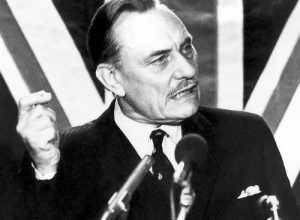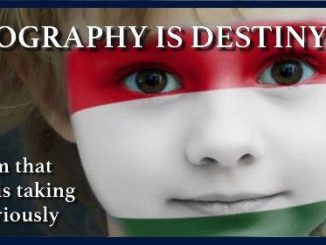
From National Front to European Civilization
An Interview with Jean-Yves Le Gallou
The following is an interview with Jean-Yves Le Gallou, a former French high civil servant, author, and identitarian activist. He was involved with the Nouvelle Droite intellectual movement as early as the 1970s before going on to join the Front National (FN). As a politician, he served as the secretary-general for the FN’s parliamentary group of 35 MPs in the National Assembly between 1986 and 1988, working closely with senior party leaders such as Jean-Marie Le Pen and Bruno Gollnisch, and was an FN Member of the European Parliament between 1994 and 1999. As such, he has been able to participate in and observe the French political scene, and in particular the struggles and travails of the Right, from a unique vantage point.
Since then, Le Gallou has been a relentless crusader for European awakening. He created the Polémia Foundation in 2002, a think-tank which focuses on denouncing the harmful effects of non-European mass migration and critiquing the biases of the French mainstream media. In 2014 Le Gallou  and activists climbed Mount Olympus to found the Iliad Institute, an organization dedicated to transmitting European culture and civilization to the next generations. The Iliad Institute was created at the request of Dominique Venner (pictured), a noted identitarian historian, who had taken his own life the year before at Notre-Dame Cathedral in Paris in what Le Gallou calls a “sacrificial act.”
and activists climbed Mount Olympus to found the Iliad Institute, an organization dedicated to transmitting European culture and civilization to the next generations. The Iliad Institute was created at the request of Dominique Venner (pictured), a noted identitarian historian, who had taken his own life the year before at Notre-Dame Cathedral in Paris in what Le Gallou calls a “sacrificial act.”
The Iliad Institute organizes five-week training sessions for about 30 cadres every year, covering various topics: philosophical debate, European history considered in the longue durée, geopolitics, criticism of the contemporary world, sports, and cultural struggle. It also organizes a large yearly conference near the National Assembly whose speakers include academics, historians, and journalists. This year’s conference, taking place on April 6, is entitled “Europe: The Time for Borders.”
* * *
According to your CV, you have been both a high civil servant and an FN elected official. Is that actually possible?
Yes, I was a civil servant both before and after working for the FN. That is the good side of the French system: you can have political or ideological activities and remain a civil servant. I had a bit of a double life after working for the FN. I was in charge of monitoring and evaluating other government services. We covered all kinds of issues: the environment, transport, civil protection, rescue services and IT modernization. Of course, they kept me away from positions dealing with immigration but, anyway, in the current system I wanted nothing to do with them!
It was not always easy. Some colleagues may privately agree with you, but as soon as you are among others, the political correctness wall of silence comes down. The System is maintaining itself through this kind of double-talk and double-think. For my part, I always quite clearly indicated what I thought deep down.
Freedom of opinion and thought is better protected in the civil service than in large companies. Unfortunately, this is beginning to change. I know a judge who now has problems because of his views, although his case is still going through the courts of appeal.
The Code du Travail [labor legislation] in theory protects politically-incorrect opinions. There is even a penal law which bans discrimination because of someone’s political views. Thirty years ago, I would say opinions were indeed protected. But today, in practice, the law only protects politically-correct opinions. Companies are becoming more and more totalitarian, they claim to defend “values,” and so will fire people for the wrong opinions even if they are good for business.
[Interviewer’s note: Several other nationalist or identitarian French politicians have also been high civil servants. These include Anne Kling, Henry de Lesquen, and Florian Philippot.]
Could you speak about the FN parliamentary group at the National Assembly, whose work you coordinated between 1986 and 1988? The presence of a large nationalist contingent (35 MPs) at the national parliament has been unheard of since!
It was a parliamentary group of a very high level, real top class people, with many graduates from the Grande Écoles. Our role was essentially that of a “tribune of the people”: monitoring, criticizing, and serving as a check on the government. The group was very present and was even heard. We were an effective watchdog. This serious work was a great boon to the FN’s credibility, which no doubt made it possible for Jean-Marie Le Pen to break through with almost 15% of the vote in the 1988 presidential elections.
 [Interviewer’s note: for the 1986 elections, President François Mitterrand (pictured), a Socialist, in a Machiavellian move instituted proportional representation so as to divide the Right between conservatives and nationalists. This did not prevent the fall of his Socialist government. The traditional majoritarian system, punishing smaller parties of both left and right, was reinstituted in 1988.]
[Interviewer’s note: for the 1986 elections, President François Mitterrand (pictured), a Socialist, in a Machiavellian move instituted proportional representation so as to divide the Right between conservatives and nationalists. This did not prevent the fall of his Socialist government. The traditional majoritarian system, punishing smaller parties of both left and right, was reinstituted in 1988.]
In Italy, there have long been electoral and even governmental alliances between nationalist and conservative parties. Yet in France, there seems to be an omertà. How were relations between the FN and conservatives in the 1980s?
A dialogue was possible with the mainstream right, with which we even had cordial relations privately. However, publicly it was impossible for them to take up one of our proposals even if they shared our views.
There were local electoral alliances between the FN and the mainstream right in Dreux [a town of 30,000 people to the west of Paris] in 1983 and in Marseille in 1988. Then it became impossible. Those conservatives who crossed the line and advocated any alliances with the FN were politically destroyed. In 1998, Charles Millon, who had been a conservative defense minister, became president of the Rhône-Alpes region thanks in part to the vote of FN regional councilors, who would not participate in his administration. This was then not an intimate alliance. But he was toppled soon thereafter anyway.
Why did nationalist-conservative alliances become impossible?
In France, such alliances were forbidden by a certain number of pressure groups who considered them unacceptable: the Grand Orient of France (a left-wing Masonic lodge), the CRIF (Representative Council of Jewish Institutions of France), the so-called anti-racist groups, and the LGBT groups, working with the mass media. We were also opposed by the B’nai B’rith, usually a fairly discrete group, and even by the Conference of Bishops of France. All these forces fought against any possible alliance between the mainstream right and the FN, and tried to liquidate any politicians who were tempted.
The mass media and their demonization of dissenting politicians and thinkers are extremely important. The level of political correctness differs by country. In Italy, there is more freedom of tone and thought. [Interior Minister] Matteo Salvini expresses views while in government which Marin Le Pen cannot express even in the opposition! I think the Italian press is more pluralistic. The press in France is made up of the State on one side and 10 billionaires on the other. Alternative media still represent perhaps only 1% of the influence of the mainstream ones.
Do you think Jean-Marie Le Pen – and notably his so-called dérapages (verbal excesses) – were responsible for the FN’s marginalization?
The conventional wisdom holds that the FN’s demonization was caused by Jean-Marie Le Pen’s supposedly anti-Semitic dérapages. Personally, I don’t think so. Le Pen may have contributed to this demonization, but really the process of demonization was independent of this.
In fact, any person who criticizes immigration – at least in France, Germany, or Great  Britain – will be demonized. The first man to be demonized in postwar Europe was Enoch Powell (pictured)– a leading figure of Britain’s Conservative Party, a classics scholar, a brilliant man – who gave a speech opposing immigration and was politically destroyed as a result. There was no trace of anti-Semitism there.
Britain – will be demonized. The first man to be demonized in postwar Europe was Enoch Powell (pictured)– a leading figure of Britain’s Conservative Party, a classics scholar, a brilliant man – who gave a speech opposing immigration and was politically destroyed as a result. There was no trace of anti-Semitism there.
Then there is the more recent case of Thilo Sarrazin in Germany, who though coming from the Social-Democrats, denounced immigration. His career was also destroyed. The Alternative for Germany (AfD) party is also being demonized. As is the prime minister of Hungary, Viktor Orbán. It doesn’t matter what you do: as long as you oppose immigration, you will be demonized.
Jean-Marie Le Pen’s demonization began before his rough comments on World War II or the Jews [starting from September 1987]. The formal ban on alliances with the FN dates from 1986, whereas he was received by the World Jewish Congress in New York as late as spring 1987. On the flip side, Marine Le Pen has made great efforts to distance herself from what her father was criticized for and the results are basically marginal.
What was it like serving in the European Parliament from 1994 to 1999?
I feel very strongly that I am a European. We share the same civilization, challenges, and destiny as our European neighbors. However, the period in which I felt the least European was when I was in the European Parliament. It was a great globalist thingamajig with no European spirit.
At the National Assembly, the FN was at least part of the political game. In the European Parliament, we were 13 with the Vlaams Blok (VB, Flemish nationalists), but we counted for nothing. We were a voice in the wilderness.
Things may begin to change with the EU elections taking place this May. With the further breakthrough of nationalist parties, there may be a threshold beyond which the centrist parties will no longer be able to secure their majorities. Then we could begin to block things.
In 1999, the FN experienced a bitter dispute between the followers of Jean-Marie Le Pen and those of his second-in-command, Bruno Mégret, which permanently split the party. You are among those who left with Mégret. Why did this split happen? I must admit I still don’t understand why it occurred.
That’s quite understandable! There was a personal component: a war between chieftains and Le Pen’s tendency to keep his seconds from growing. There was also a political component: no divergence on the substance – immigration, the EU – but on style. Mégret wanted to make the FN more palatable. There was also a disagreement on strategy. Le Pen did not believe engaging in local politics would be useful, whereas Mégret did.
For me, the main cost of the split was the fact that if the FN had begun establishing itself at the local level, the party might control 60 or 80 town halls today. This could serve as a political springboard and the mayors could have done many things. The second cost was the purge that accompanied the split. The party lost many of its cadres and best elements. And those who stayed with Jean-Marie Le Pen were then purged by his daughter a decade later. Marine Le Pen’s personal management has been catastrophic. The FN has never recovered from these purges.
In the North-American Alternative Right, the question of European unity is a fairly divisive one. Some, like Richard Spencer, consider European unity to be a priority, a prerequisite to greatness, while others think that the contempt for national identity is symptomatic of White Americans’ lack of identity. What do you think?
This is a fairly complex issue. At the Iliad Institute, we stand for the defense of European identity and civilization. There is a civilizational unity in Europe. But among the elements of European civilization, there has been the development of the nations. The national identities are a part of European identity. It would be utopian to have the nations disappear, even though they share in a common struggle to defend their borders and civilization.
I don’t really support the narrow sovereignist discourse which is liable to cause problems between France, Germany, and Britain. I don’t think Brexit is very interesting. It has made possible the reduction of Polish immigrants, but not of Pakistanis, Afghans, and others coming from the rest of the world. I think Frexit would be the wrong struggle even if the European Union does not work today. The problem is not the institutions as such but their political and ideological orientation. Viktor Orbán as president of the European Commission, that would be something else!
We shared our vision of Europe – which is not the EU – in a video: “Neither Lampedusa, nor Brussels, be European!”, which has accumulated 5 million views. There have been 4.5 million hits in French and about 500,000 in other European languages. Significantly, the most popular non-French version was Hungarian with 161,000 views. By contrast, the English version has only 13,000 views, about half coming from the United States. That is quite remarkable given that Hungary only has a population of 10 million people!
There should be a total halt in immigration to Europe from different or incompatible civilizations. We Europeans should highlight and build upon our common civilizational heritage. And perhaps we should build a shared European historical narrative: just as there is a national narrative in France or Italy, we could have a European narrative which would be the story of our achievements and discoveries, and of the battles which we fought together to save Europe, notably in the 14 centuries of struggle against Islam. Only if Europeans remember who they are, their deep history, will they be able to reclaim their identity and destiny.
************
Original article









